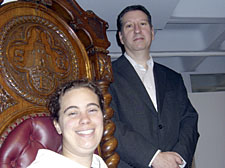|
|
 |
| |

Mark Aston with Cllr Ruth Polling, seated in a 19th-century judge’s chair in the exhibition, taken from the old Clerkenwell County Court |
The death penalty: a history of infamy
New exhibition to explore the borough’s often controversial use of capital punishment
THE late great socialist orator Dr Donald Soper is heard speaking out against capital punishment in 1958 in a remarkable exhibition launched in Islington this week.
In the Pathé news clip Dr Soper explains why he is against hanging. “I’m against it because it’s cowardly,” he says. “I’m against it because it’s inefficient, I’m against it because it’s evasive – often sadistic, and out of date, but above all, I’m against it because I’m trying to be a Christian.”
Infamous murders and capital punishment are among the subjects explored in a A Fair Cop at Islington History Museum.
The exhibition, at the museum in St John Street, EC1, tells the story of crime and punishment in periods of mass crime including murder, muggings, prostitution and highway robberies far worse than today’s often perception of crime.
Visitors can discover how law and order developed from the 18th century to the 1950s, including the desperate no-go areas of Islington’s Victorian slums and high-profile Edwardian murder cases.
The famous convicted wife killer Dr Crippen, who lived in Hilldrop Road, Holloway of course features. The exhibition includes the latest forensic evidence from America that suggests that Crippen may not have been guilty – evidence that suggests the remains purported to be that of his murdered wife appear were not hers after all.
It looks at the last woman to be executed in the UK, Ruth Ellis, hanged in Holloway Prison in 1955, a death that sparked passionate debate on the death penalty. Even executioner Albert Pierpoint was unhappy about it.
The exhibition features original Pathé News footage of a huge demonstration against the rope outside Pentonville on the eve of the execution of Ronald Marwood. He was put to death for the drunken murder of a policeman.
Victorian police handcuffs, truncheons, and lamps are also on display, alongside brandy offered to prisoners on the morning of their execution.
Between 1832-34 Parliament abolished the death penalty for shoplifting goods worth five shillings or less, returning from transportation, letter-stealing and sacrilege.
Gibbeting – where executed corpses were displayed publicly in cages – was abolished in 1843. In 1861, the number of capital crimes was reduced to four: murder, treason, arson in royal dockyards and piracy with violence. Public executions stopped in 1868 and the hanging, beheading and quartering of traitors ended in 1870.
Less than one century later, Parliament voted to suspend for five years the death penalty for murder when it passed Sidney Silverman’s Private Member’s Bill in 1965.
Mark Aston, the local history manager at the Islington History Centre who organised the exhibition, will be asking visitors to write their views on whether they support capital punishment.
Councillor Ruth Polling, Islington Council’s executive member for leisure and equalities, said: “This thought-provoking exhibition covers some very well-known cases as well as casting light on little-known local history and lives from the past.”
Crime scene – Special investigations
• The Clerkenwell Explosion: Fenians and the House of Detention – On December 13 1867, a beer cask of gunpowder blew a huge hole in Clerkenwell’s House of Detention, killing 12. Mark Aston, looks at why and what happened next. Thursday December 3, 6.30pm.
• Islington’s Baby Farms. Author and ex-policewoman Joan Lock investigates “baby
farming”, where unmarried women were given money to foster or adopt children. But one-off payments for care led to neglect and even murder. Thursday January 21, 8pm.
• Criminal Islington – A talk by Councillor Greg Foxsmith. Thursday February 4, 6.30pm. |
 |
|
|
 |
| |
| |
|
 |
|